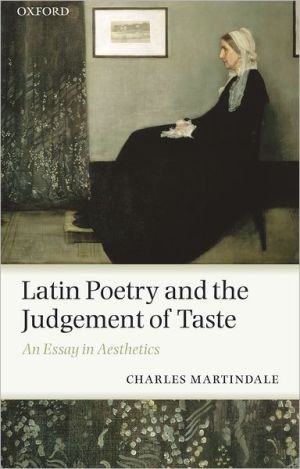

 |

|

The average rating for Latin Poetry and the Judgement of Taste: An Essay in Aesthetics based on 2 reviews is 3 stars.
Review # 1 was written on 2014-06-08 00:00:00 Rick Menard Rick MenardThis book will provide you, as long as you know basic Latin grammar and a fair vocabulary, with everything you need to fulfill any purpose in learning about Latin verse. Whether you know nothing about Latin verse and want an introduction, or you want to compose Latin poetry yourself, or you want to read Virgil and Horace in the original and appreciate their artistry, this book will provide everything. The Table of Contents is arranged mainly around the various meters. The first and most deeply cover meter is Hexameter, and the other meters--elegiac couplets, Sapphics, Alcaics, Hendecasyllabics, Asclepiadic meters, Iambic meters--are all covered. By "covered" I mean that you can find more than the sequence of long and short syllables that define the meter: you find out how variations of the meters are represented in Virgil, Horace, Catullus, etc; what distinguishes the Greek and Latin uses of the meter; what genre the meter is often used for; the use of caesura, synizesis; and many other details. The meters become more than linguistic manifestations of Morse code; they become vehicles for expression. Within the portion of the book that covers any given meter, there are sections of explanation and alternating exercises in scansion, arrangement, and composition that allow the reader not only to read the verse, but to compose it. The exercises range from the most rudimentary (scanning an example) to the most challenging (translating an English poem into Latin). Personally, I have managed to compose a few lines in Latin. The copious descriptions and examples got into my head, and I obtained a small intuition to compose. That experience alone justifies the book. Just note that there are no translations provided. For this book to be any use, you will need at least a rudimentary knowledge of Latin grammar and a dictionary. In fact, in a few details (such as the commentary on the use of Greek names in Latin verse), some knowledge of Greek (although not required) would be helpful. If you have any interest in Latin literature at all, you will not regret buying this book. |
Review # 2 was written on 2016-06-08 00:00:00 Janis Meadows Janis MeadowsThe papersin this collection are a mixed bag. I found Williamson on Medea interesting and compelling; Gill on Self in Hippolytus was very interesting in glimpses, but laboured. March on Euripides' misogyny did not always seem to argue a case rather espousing a sympathetic Euripides with a final paragraph turning back to misogyny. An interesting collection, but... |
CAN'T FIND WHAT YOU'RE LOOKING FOR? CLICK HERE!!!